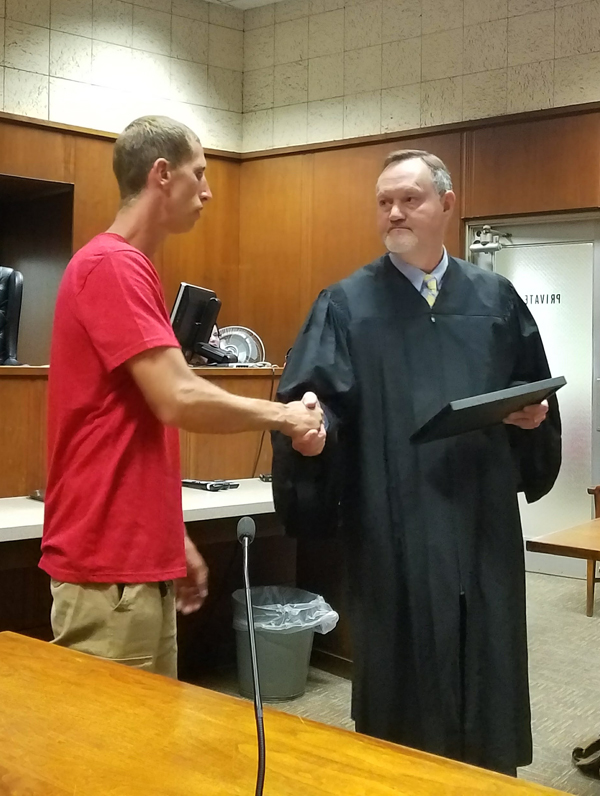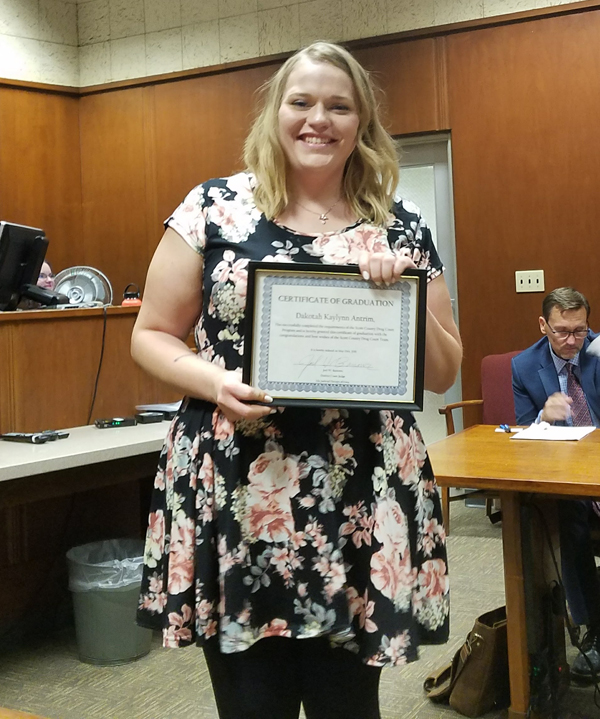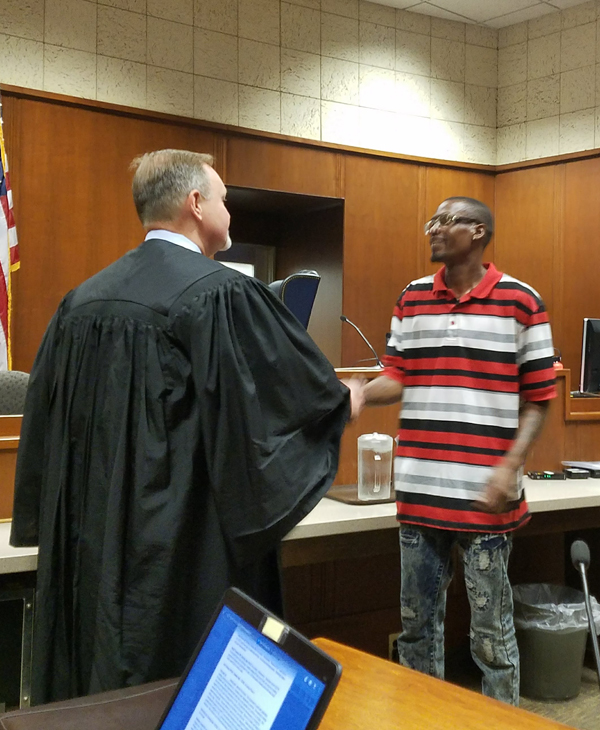By Barb Arland-Fye
The Catholic Messenger
A third-floor courtroom in the Scott County Courthouse provided the backdrop for a celebration of renewed hope and a testament to the power of teamwork in changing people’s lives.
Dustin Frymoyer, Dakotah Antrim and Andre Davis graduated from Scott County Drug Court on May 25 as their supporters watched with pride, and a few tears.
The graduates are among 85 alumni of Scott County Drug Court, established in 2002 as a voluntary prison diversion program targeted at nonviolent, habitual offenders. Drug Court partners with the community to address underlying problems that have contributed to a person’s contact with the justice system. The program takes 15 to 24 months to successfully complete. Just one other Drug Court operates within the borders of the Diocese of Davenport. It serves Des Moines, Lee and Wapello counties in the Eighth Judicial District.
Diocesan Social Action Director Kent Ferris said the diocese continues to provide moral support to participants of Scott County Drug Court and modest financial support for events such as the graduation ceremony.
An abbreviated session of Drug Court preceded the graduation ceremony in the Scott County courtroom with several current participants sharing progress reports. “Drug Court has been an amazing thing for me. It’s taught me how to live a sober life,” one young woman said. “When life gets tough, I can handle it now. I can utilize the resources available to me.”
A young man named Ryan, returning to Drug Court after a temporary suspension, confessed that he had made things difficult for himself. “Insight isn’t half the battle,” Garth Carlson, the attorney assigned to defend and assist Drug Court participants, told Ryan. “It’s doing the hard work, one day at a time.” That hard work includes participating in treatment for addiction, accepting intensive supervision, holding a job, attending support group sessions, and letting go of destructive relationships.
The three graduates, introduced by Scott County Drug Court presiding Judge Joel Barrows, have done that hard work. Hugs and handshakes with the judge and other Drug Court team members conveyed that fact.
“We are here today to celebrate recovery, rehabilitation and redemption. I have had the privilege and pleasure of overseeing Drug Court for the last 17 months. It has been a rewarding and eye-opening experience that has taught me much about the disease of addiction, but even more about the power of the human spirit,” Judge Barrows said.
“This is truly a team effort. No one who has successfully completed this program doubts that. The people gathered here have become brothers and sisters in recovery, sharing each other’s struggles, setbacks and accomplishments. Recovery is a lifelong process, but today we celebrate a most significant achievement, graduation, and the beginning of a new chapter in the lives of those who have passed through this court. They will go forward with new skills and renewed hopes to face the challenges they will confront in life, but they do not go alone. We will always be here for them,” the judge said.
Building confidence

Drug Court graduate Dustin Frymoyer is congratulated by Judge Joel Barrows.
Frymoyer, a lanky 31-year-old with a humble demeanor, told the courtroom how he’d started using marijuana at age 13 and began delivering the drug about a year later. But, he said, “My past does not define my future.” He’s looking forward to continued employment with Pleasure Pools & Spa in Davenport where he has worked seven years, with two years off during his incarceration.
“You’re doing everything you said you would,” Probation Officer Johnna Kay said. “You surprised me.” “If I can stay away from drugs, I’ll be alright,” Frymoyer said. “Some days are harder than others.”
Defense attorney Carlson encouraged Frymoyer to maintain confidence. “I hope you’ll give back to this community and to yourself.”
“I greatly appreciate you guys for allowing me to succeed,” Frymoyer told the Drug Court team. “You are what Drug Court is about,” Judge Barrows said.
Frymoyer’s parents, Renea and Forrest, are deeply grateful for Drug Court. “We got our son back,” Forrest said during a reception and lunch after graduation.
A changed life
Back in the courtroom, Judge Barrows introduced Antrim, 27, as “another person who has been a delight to go through this program.” He also teased her about missing her curfew calls. She managed to work around that challenge and today works as a supervisor in One Eighty, a Christian-based organization in Davenport that works to prevent crisis, poverty and addiction. She also operates a candle-making business at One Eighty.

Drug Court graduate Dakotah Antrim proudly shows off her certificate of graduation.
She told the courtroom that she started using marijuana as a young teenager and graduated to heroin. She spent time in county jails for drug-related crimes. More than anything, she wanted to be sober. One Eighty helped her to find God and Drug Court provided the tools she needed to work her way toward sobriety, self-discipline and self-sufficiency.
Her face glowed as she posed for a photo holding her Drug Court graduation plaque. She gave credit to everyone who supported her along the way — the Drug Court team, One Eighty staff and participants, family and God. “They built me up from nothing,” she said. “I changed my life; my life is astonishingly different.” Judge Barrows agreed. “You are a totally different person, and such an uplifting person.”
“You are a tremendous role model for a lot of people,” added Probation Officer Bob Behm. After congratulating her, Carlson urged her to “keep going forward.” Antrim plans to pursue a college degree in social work or counseling “to help people who struggle like I did.”
From drug dealer to business owner
Judge Barrows bragged up all three of the Drug Court graduates, including Davis, “one of my favorite people.” The 38-year-old owns a construction business with Drug Court alumnus Jeff Keefe. “How cool is that? That is an astonishing accomplishment,” the judge said.

Drug Court graduate Andre Davis shakes hands with Judge Joel Barrows.
Like the other Drug Court graduates, Davis faced sometimes frustrating challenges on his journey to graduation. He was in prison on a 25-year sentence related to selling drugs when he began writing to the Drug Court team every other week for a year, begging to get into the program. He had to prove he was willing to change. “I’m so thankful for Drug Court,” Davis said. He turned toward Carlson and gave him a big hug. “I love you like my uncle. Anytime I called, you listened. You’re a great husband and father.” Carlson, in fact, helped Davis and his partner set up their business.
Davis admitted to butting heads with Drug Court probation officers Johnna Kay and Bob Behm. “It took a long time for you to realize that others had your best interests” at heart, Judge Barrows said. “I’m so happy with where you are at right now — on a path to great places.” Behm added, “You’ve got success written all over you.”
Martin Georgi, Men’s Home Assistant Supervisor for One Eighty, gave a faith-filled talk aimed at the graduates. He shared his own story of redemption as a recovering drug addict and imparted the lessons he’s learned. “This is not the end,” he said, referring to the Drug Court graduation ceremony. “This is the beginning. This is what you put into practice. You cannot keep what you learned here. You have to pay it forward.”
Additional information on Drug Court
Goals of Scott County Drug Court
• To provide assessment, education and treatment to drug offenders geared toward providing rehabilitation and long-term recovery.
• To reduce recidivism and provide a cost-effective alternative to incarceration through community monitoring and treatment-based services.
• To monitor compliance in treatment and court orders through regular court interaction and community supervision.
• To promote positive interactions between the offender and the courts, community and family.
• To assist in building a pro-social individualized recovery program.
• To foster restorative justice by means of repaying restitution and providing service to victims and the community.
Cost effectiveness of Drug Court
Loxi Hopkins, a volunteer with the Diocese of Davenport’s Social Action Office, attended the Scott County Drug Court graduation ceremony with office Administrative Assistant Esmeralda Guerrero. “It brought tears to my eyes to hear the graduates speak of their struggles and what it took to get where they are today,” Hopkins said in a Facebook post. “This gives people the tools to change lives in a way that jail doesn’t.” She said she wished that every elected official would take the time to experience drug court. “It would give a clear picture on how our tax dollars should be spent.”
The average per day cost for a Drug Court participant was $21.47 in Fiscal Year 2015, compared with an average per day cost of $93.61 for a prison inmate, according to the Iowa Department of Corrections.
Scott County Drug Court team
District Court Judge Joel Barrows, presiding Drug Court judge
Garth Carlson, a private attorney who handles the defense work for Drug Court on contract
Probation Officers Johnna Kay and Bob Behm, Seventh Judicial District Department of Correctional Services
Nik Kerr and Jenny Riehl, Center for Alcohol & Drug Services
Leslie DeLaere, Davenport Police Department











